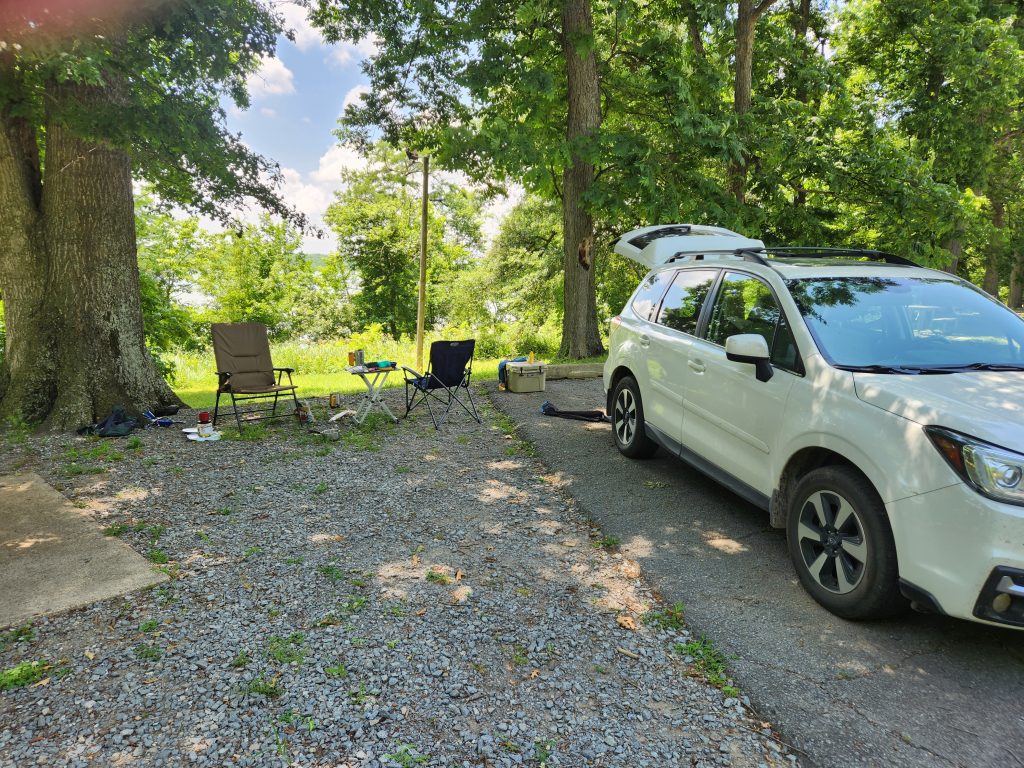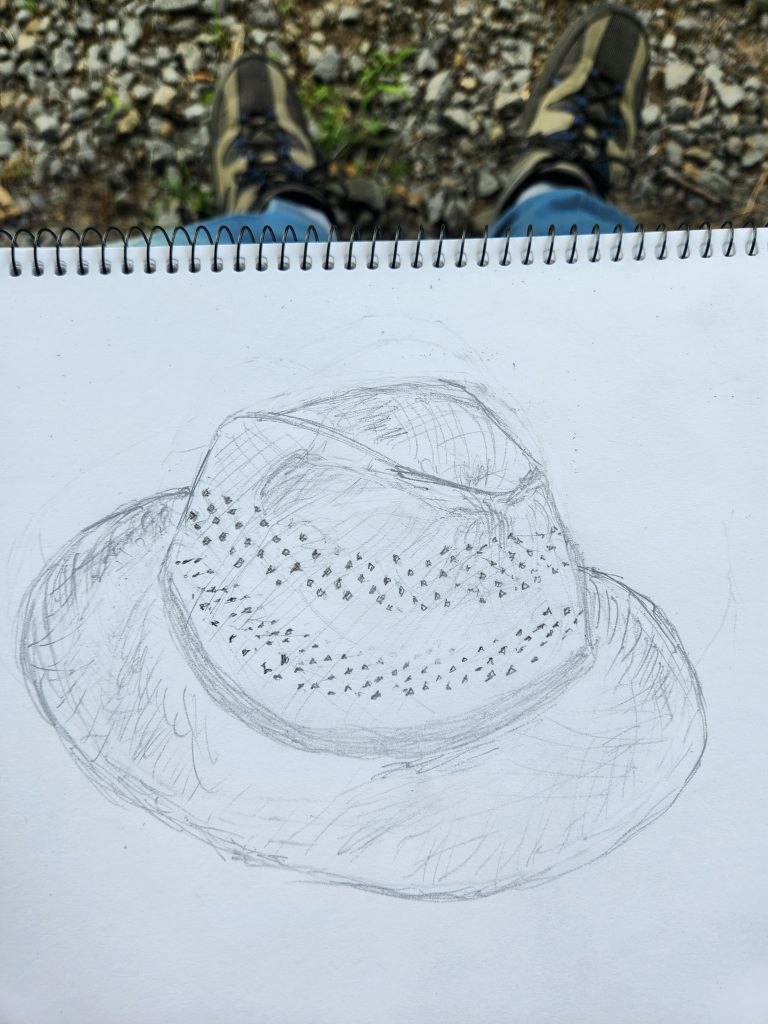I am still near the town of Lake Village, Arkansas. I took an eight mile trip out to see the nearby state park that is located on the banks of Lake Chicot. It is a very pretty little park, with perhaps 60 camp sites, most of which are set up for RV’s with water, power and sewer hookups – and free showers in the bath houses scattered around the camp site. It is so attractive that I decided to stay for a couple of days, living outside instead of in those cramped, isolated cells they call hotel rooms. The hotel rooms are convenient, but it sure feels better being outside with the trees, grass, lake, birds and raccoons. The weather is near perfect except for the feeling that it might rain. I decided to give it a try.

This was my first experiment with my new “bed invention” for the back of my Subaru Forester. I prepared for this possibility by making a wooden bed frame that folds up flat(ish) when traveling so that the seats are in their normal configuration. When the back seats of the back seats are folded down my bed unfolds to create a flat sleeping surface extending from the cargo hatch to the back of the front seat. The head end has no support from the car, so it is cantilevered about 18 inches. This creates a 24 inch wide, 79 inch long bed. Since I am only 77 inches long, I fit! I purchased a self-inflating mattress that just fits this platform. Perfect. Getting in and out of bed in the tight space was a bit of a worry, but it turns out to be easy. The cargo hatch operates from the key fob, so once inside I can push a button to close it, and another to open it in the morning. In the morning it feels a bit like being in a space ship or something, with the motor whirring as the hatch slowly opens the “air lock” to the outside. I can open the moon roof to get a nice view of the sky while lying on my back in bed. Nice.
In addition to trying out the bed, this was the first trial of my new Biolitetm stove that uses a handful of twigs as fuel. The heat unit is vertical cylinder about 10 inches high five inches in diameter. It is a crazily high tech device considering it just burns sticks to boil water or cook a meal. It has a lithium battery that runs a fan for the fire and can be used to charge a cell phone. I charged my cell phone on it this morning. You fill the burner compartment with small pencil sized sticks, light a fire in the burn basket and turn on the fan. The fan has multiple settings so you can adjust the burning rate of the fire. A pot sits on top, or a large grate can be used as a grill. There is a thermocouple in the burn pot that creates electricity to charge the battery, run the fan, and change a cell phone or other device. It comes with a light that plugs into the battery, providing lighting if desired. The battery runs the light, the fire doesn’t have to be burning. It works, and is kind of fun to play with. The only down side so far is that it takes more than one load of sticks to boil a pot of water, meaning I have to add sticks from time to time. This is not a problem when just heating the pot because I can just lift the pot off of the stove, but I think it might be very difficult when using the grill attachment.
I made a bit of a mistake on my second night. I thought I put all the food out of reach of critters, but about an hour after turning in I heard noises in camp. Peering out of my car with my flashlight there were lots of glowing eyes! Four raccoons were exploring the things I left out on the table, checking them out and then throwing them off onto the ground. In the morning I discovered that I hadn’t been so careful, they found my box of crackers. My dumb fault, of course something would come by to get them. I was lucky it was just a band of inquisitive raccoons.
Having driven across about 2/3 of the USA and finding many towns in economic collapse, I am really wondering what is going on. A persistent question is; “Why are these towns no longer needed?” It appears that perhaps fifty years ago they were vibrant, thriving communities. That would have been around the time of the Viet Nam war, the time when my generation thinks about when we consider “how things were.” Yesterday I was talking to an old friend, even older than me, who was telling me about a trip that he took into America when he was a young sprout of 21 or so. He talked about all of the fun towns, the fun bars filled with music, the wonderful restaurants with amazing local dishes, and the pretty girls. He expressed surprise that I wasn’t reporting on those things. Instead, I am describing towns that were like that when he took his trip, but now are derelict buildings with the roofs caved in and the walls falling down. It was, but it no longer is.
The cause of the decline seems pretty clear in the town of Lake Village. Lake Village is in the middle of a huge agricultural area created by silt deposited by periodic flooding of the Mississippi river. A hundred and fifty years ago the land was worked by slaves. That changed after the Civil War, but the labor needs didn’t. Share cropping became the new form of cheap labor because while the share croppers received part of the profits, they did so with little or no outlay of money for the landowners. It was all income and very little outgo, perhaps less expensive than slaves in many ways.
This form of labor-intensive farming, coupled with limited transportation, resulted in the need for small local communities. As mechanization took hold in the fields, the need for a large labor force went away, with the concurrent abandonment of the towns. That might account for much of the decrease. However, it clearly is much more than merely the decreased need for agricultural labor – there was a decreased need for all types of local labor as the economy shifted to “off shoring” jobs by moving production of all types of goods to less expensive countries. We became a service economy. Things that were made here were first moved to Japan, then to China and many other low income countries. As an example, when I was in Viet Nam in 2006 I visited some garment factories making many of the name brand clothes sold throughout America. They were being made by hand because labor was so inexpensive; a high-paid garment worker received $1 a day for 16 hour days, many of them standing at their looms the entire time. They worked seven days a week, for $365 a year! I won’t mention the brands that were being made, but they were all well-known brands what you wouldn’t think to associate with what I considered labor exploitation. There was no possibility for workers in the USA to compete with these wages, therefore they get nothing instead of almost nothing.
The vast tree plantations tell a similar story of reduced need for labor. It the old dayss, trees were cut, brushed and bucked by lumberjacks. Now the trees are all the same size and are harvested with huge machines that grab onto a tree, clip it off at the base, slide a delimber up the tree, buck it into lengths and load it all on a log truck. There is almost no labor involved. A few specialized machines and trained operators can log these vast man-made forests – very little labor is required.
In addition to noticing what is not here, I have been noticing two interesting situations. One is the ubiquitous Dollar General stores. They seem to be everywhere. If a town has any kind of store, at least one of them will be a Dollar General located in a parking lot near the cluster of hotels, but not in a mall – they are almost all identical looking stand-alone stores. I see very few of those high priced, fancy stores such as Walmart, but I do see a lot of Dollar General stores. I am only seeing what is on my thin path across the nation, but if what I see is any indication I would have to say that America is on a race to the bottom.
The other thing that is interesting is huge number of utility trucks and workers every place I go. They fill the hotels and there trucks are just about everywhere there is a “where.” I have spoken to a few of them and the story is always the same, they are “stringing wires.” It looks like perhaps America is in the process of being rewired. Our electrical and telecommunications networks are being changed in big ways. I don’t know what this means, or what the consequences might be for the future, but it is clear that something BIG is up.
I am curious what I find as I work my way further south-east and then up the eastern seaboard, or whatever path I end up taking. Wherever it leads, it is time to do the laundry again.
My couple of days in the park have been quite nice. Just a peaceful time to read a little, write a little, watch the birds and take short hikes. I chat with other campers now and then, but most of the time I am just being by myself. I hope to get out my sketch book this afternoon to practice sketching. There are not many interesting buildings here. Therefore I am going to have to move from mostly rectangular shapes to more natural, rounded ones. I am a bit nervous about that. However, I can always throw my failed sketched away – nobody needs to know.

Jim, I drew this one with a carpenter’s pencil.
Good post. I absolutely love this site. Thanks!